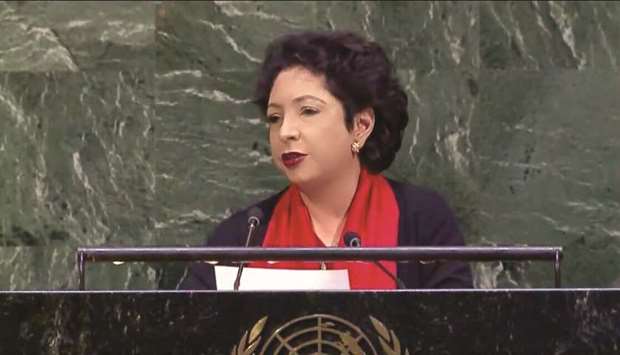A senior Pakistani diplomat has called for the international community to act in a “consistent and uniform” manner to all transgressions, not selectively, as she highlighted the gross violations that continue to the subject of repeated UN Security Council resolutions.
“We should not allow human suffering to be selectively prioritised for political convenience or to serve narrow interests,” ambassador Maleeha Lodhi said during the UN General Assembly debate on the “Responsibility to Protect and Prevent Crimes Against Humanity”, in which she also cautioned against becoming oblivious to the suffering of those who have been displaced and marginalised.
Agreed at a summit of world leaders in 2005, the concept of “Responsibility to Protect”, also known as “R2P”, holds states responsible for shielding their own populations from genocide, war crimes, ethnic cleansing, and related crimes against humanity, and requires the international community to step in if this obligation is not met.
Focusing on the role played by hate speech to incite violence, the Pakistani envoy said that Islamophobia has become the most prevalent contemporary expression of this vile narrative.
“We know only too well from our neighbourhood how the abiding lure of communal politics has become the most assured pathway to political power,” she told the 193-member assembly.
Concerted efforts are required to reverse the tide of hate and bigotry that threatens to undermine social cohesion and peaceful coexistence within societies, Lodhi said.
While stressing that the notion of the “Responsibility to Protect” stands on more tenuous ground today than ever before, she said that decisions taken by the international community, have in this regard, continue to betray the test of the highest standards of objectivity and impartiality.
“At its core,” Lodhi said, “the responsibility to protect is not a licence to intervene in external situations, but, is instead, a universal principle of ‘non-indifference’, in keeping with historical context and cultural norms of respective settings.
“It is predicated on the express recognition that the responsibility for the protection of civilians lies first, and foremost, with member states.”
In this regard, she called for recommitment to the UN Charter, based on the inherent dignity and worth of the individual, and the provision of fundamental human rights, including the right of peoples to self-determination.
The best way to achieve that objective is through operationalising the principle of “Right to Development” – encompassing the right to food, shelter, fair terms of trade, debt relief and adequate access to finance and technology.
“After all,” Lodhi said, “in a world beset by socio-economic inequalities, many situations leading to turmoil and conflict are the result of under-development and poverty.
“A prevention-centric focus must be prioritised as the cornerstone of any protection-oriented approach, as it costs far more to pick up the pieces after a crisis than it does to prevent one.”
“Set against the over-arching principle of state sovereignty, the responsibility to protect cannot become a basis to contravene the principles of non-interference and non-intervention or question the national sovereignty or territorial integrity of states,” she added.

Lodhi: We should not allow suffering to be selectively prioritised.
